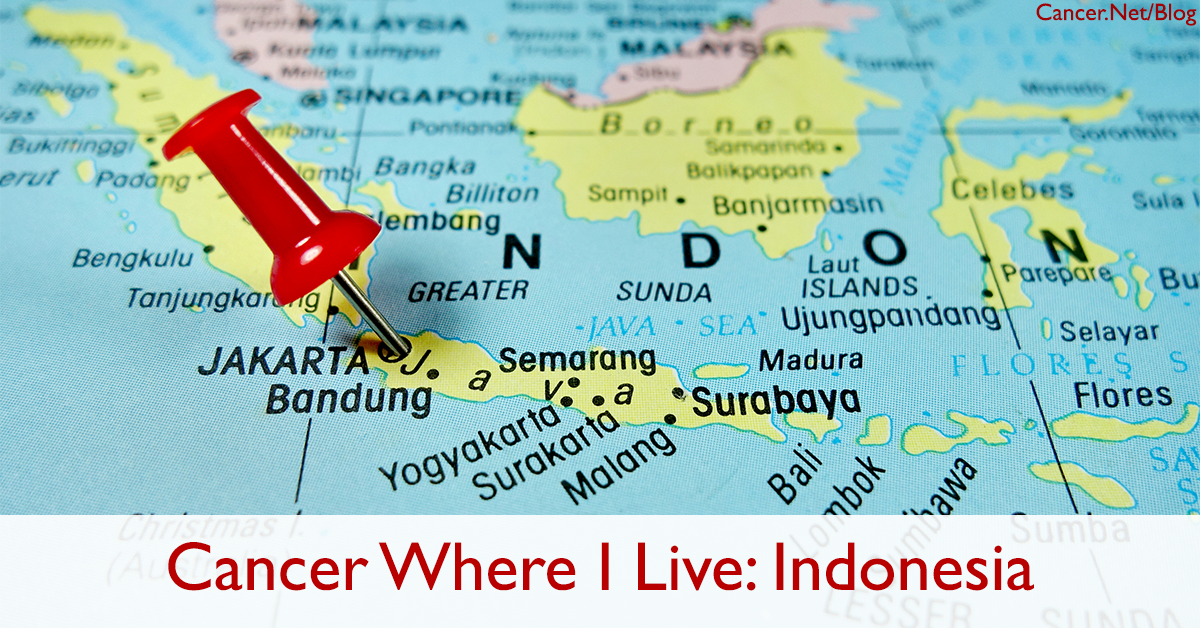
Cancer in My Community is a Cancer.Net Blog series that shows the global impact of cancer and how people work to care for those with cancer in their region. Diah Martina, MD, is faculty staff at the Faculty of Medicine Universitas Indonesia and Cipto Mangunkusumo National General Hospital in Jakarta, Indonesia. She completed her palliative care fellowship program at Erasmus University Medical Center in Rotterdam, Netherlands, and is currently doing her PhD at the same institution. Her research interests are end-of-life care, communication, cross-cultural adaptation, and palliative care capacity building. Dr. Martina is a council member on ASCO’s Asia Pacific Regional Council. She is also a former ASCO International Development and Education Award (IDEA) recipient. You can follow Dr. Martina on Twitter.
Why I care for people with cancer
Indonesia has a high prevalence of advanced cancer with a lack of a well-integrated palliative care service in its system to help improve quality of life for people with cancer. Palliative care, also called supportive care, is the treatment of the symptoms and side effects of cancer and its treatment. As a clinician in Indonesia, I have witnessed how painful it can be to live with cancer in my country. When I began my career as a health care professional, I was not confident enough to prescribe medications like opioids to people with cancer for pain or breathlessness. During my residency, I would often feel hopeless and like a failure for not being able to provide meaningful support to people with advanced cancer. I felt ill-equipped in delivering and discussing a poor prognosis with my patients and their families without it being harmful to our relationship. Communication and decision-making was challenging due to several factors, including the stigma surrounding cancer, the prevalence of family-centered decision-making, patients holding certain religious beliefs with regard to death and dying, and the indirect communication norms in Indonesia.
I am sure I was not the only physician who felt they needed more training in this field. Therefore, I pursued further education in palliative care abroad in the hopes that I will be able to provide better care for people with cancer in Indonesia and to support palliative care development in my country.
What cancer is like in Indonesia
Cancer is the fourth leading cause of death in Indonesia, according to the World Health Organization (WHO), with nearly 397,000 people diagnosed with cancer in 2020. More than 70% of those people with cancer were diagnosed at an advanced stage when they were first admitted to a health care facility. These advanced cancer cases require palliative care to focus on the improvement of the person’s quality of life. Nevertheless, only 1% of people with advanced cancer in Indonesia have access to palliative care.
In addition to that, as the world’s largest archipelagic country, Indonesia has over 17,000 islands and 270 million inhabitants. This poses significant challenges to providing cancer care throughout the country, especially considering the lack of trained oncologists and the large gap in their availability throughout different regions of Indonesia. There are only around 140 medical oncologists and 200 surgical oncologists in Indonesia, most of whom are located on the island of Java in its capital city, Jakarta. Meanwhile, multidisciplinary care, which is when multiple health care professionals work together to treat the cancer, is not yet a standard approach in most health care facilities in Indonesia.
Not only is it that trained cancer care professionals are not equally available across the country, but properly equipped cancer treatment centers are also not equally available to patients. And, palliative care in the home and in community settings as well as novel cancer treatments are not supported by the national health insurance. All of these factors affect the quality of cancer care delivered in different regions in Indonesia.
How the Indonesian government is working to improve access to cancer care
Based on the newest Index of Cancer Preparedness, a tool that evaluates how well a country is controlling cancer, Indonesia is scored “low” for policy, planning, and care delivery, and it is scored “very low” for its health system and governance. This means that Indonesian health care systems are not well prepared to achieve major reductions in premature deaths from cancer, increase cancer survival rates, and improve the quality of life for people with cancer and survivors.
Ministry of Health in Indonesia has called for a shift in focus in cancer care from curing cancer to preventing cancer and detecting it earlier. With this shift, early cancer detection is expected to become available in most health care settings. Ministry of Health also appointed the Indonesian National Cancer Center Hospital to establish regional referral hospitals and to supervise basic cancer services at those hospitals in every province in Indonesia.
To increase the number of health care professionals trained in oncology, there have been initiatives by the organization of medical oncologists (Perhimpunan Hematologi Onkologi Medik, Perhompedin) to give internal medicine specialists extra training in oncology so they can provide basic cancer care in each province. Furthermore, to address the lack of trained professionals in palliative care, during the last couple of years, Ministry of Health provided palliative care training to primary care providers in 34 provinces and established national guidelines and training modules for palliative care in cancer.
Where people with cancer can find local resources and support in Indonesia
Non-governmental organizations (NGOs) have a great role in providing support for people with cancer in Indonesia. There are over 40 NGOs that provide support to people with cancer and survivors throughout different regions in Indonesia. They have been working independently to promote cancer awareness, advocate for new policies, support cancer care in the community setting, and establish support groups for cancer survivors all over the country.
The Indonesian Cancer Foundation (Yayasan Kanker Indonesia, YKI) is one of the largest NGOs, with over 26 chapters and 178 branches in different provinces and sub-provinces in Indonesia. Its programs include early detection, public education, assistance in accessing several chemotherapy drugs, and in certain regions, such as Jakarta, providing palliative care at home for adults with cancer. Another NGO is the Rachel House Foundation (Yayasan Rumah Rachel), which focuses on providing palliative care at home for children with cancer. Several NGOs, such as YKI, Yayasan Rumah Rachel, and Indonesian Palliative Society (Masyarakat Paliatif Indonesia, MPI), are also committed to promoting and developing palliative care services and providing palliative care training to health care professionals in Indonesia.
Finally, there are several cancer support groups that provided aid to survivors of any type of cancer, including the Indonesian Cancer Information and Support Center (CISC) and Indonesian Cancer Care Community (ICCC), and support groups for people with specific types of cancer, such as Smart Pink and Lovepink for people with breast cancer and Pita Tosca for people with thyroid cancer.
The author has no relationships relevant to this content to disclose.







